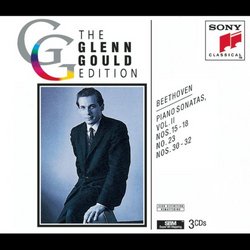| All Artists: Ludwig van Beethoven, Glenn Gould Title: The Glenn Gould Edition: Ludwig Van Beethoven Piano Sonatas, Volume II (Nos. 15-18, No. 23, Nos. 30-32) Members Wishing: 0 Total Copies: 0 Label: Sony Release Date: 4/19/1994 Genre: Classical Styles: Forms & Genres, Sonatas, Historical Periods, Classical (c.1770-1830), Modern, 20th, & 21st Century, Romantic (c.1820-1910) Number of Discs: 3 SwapaCD Credits: 3 UPC: 074645264226 |
Search - Ludwig van Beethoven, Glenn Gould :: The Glenn Gould Edition: Ludwig Van Beethoven Piano Sonatas, Volume II (Nos. 15-18, No. 23, Nos. 30-32)
 | Ludwig van Beethoven, Glenn Gould The Glenn Gould Edition: Ludwig Van Beethoven Piano Sonatas, Volume II (Nos. 15-18, No. 23, Nos. 30-32) Genre: Classical
|
Larger Image |
CD DetailsSimilar CDs
|
CD ReviewsSimply the funniest Skyburial | N-1400 Ski, Ski Norway | 09/24/2003 (5 out of 5 stars) "My perfect antidote to any form of depression: The irreverent side of Glenn Gould, deconstructing the hallowed Appassionata sonata, showing that the emperor, in this case, was without clothes. The whole record is perceptive, revealing new insights (and opinions) on Beethoven`s music. But it is not a representative Beethoven piano recording, and should be supplemented with one of the many excellent "correct" recordings that exist - Alfred Brendel is but one example. This is for those who appreciate Gould`s unique and always fresh way of making music come alive and speak to you. Enjoy!" An original approach! Hiram Gomez Pardo | Valencia, Venezuela | 06/17/2005 (5 out of 5 stars) "Shakespeare and Beethoven are two powerful examples that show that no matter you face his work, even how terrible you play his message they resist as a big tree any intention, they simply are far beyond the present circumstance, they talk to the best of ourselves and the power of synthesis and strong conviction make them indestructible. Glenn Gould's approach is an irreverent reading, trying to diminish the epic in some Sonatas and emphasizing the grief and passion. That's why the whole sum can produce great positive surprises but also terrible disappointments. For instance I love his version of the Op. 49, The Adieux, The Funeral March, Second, third and Seventh Sonatas, and even the Moonlight, the Tempest and the op. 110, because somehow this last Sonata reflects more than any other else the intimate universe of Mr.Gould. I mean, do not expect glorious results from the Waldstein or Hamerklavier. I know Gould to guess he could do a best performance but simply didn ` t because his intention was clearly to refuse the argument lines and the historicity. I agree totally with him in what concerns with the absence of any Romantic approach with Beethoven, and in this sense he triumphs in several works due the true Beethovenian dissonances must sound hard, bitter and wild. " GET GOULD's BEETHOVEN!... Sébastien Melmoth | Hôtel d'Alsace, PARIS | 05/22/2006 (5 out of 5 stars) "GG does something with Beethoven: the voicing, the phrasing, the accents--all brilliantly insightful and ingenious. Not to mention GG's miraculous digital ability: he had skills like no other: he does things because he COULD do things. You see?
The Opp. 31s are great; but the real treat is the last great three sonatas Opp. 109-11. I have Pollini; I have Kempff--whom I usually prefer to anyone with Beethoven; still, Gould beats them all here. I just keep listening to GG's Opp. 109-11 over and over again. Each hearing reveals new exquisitenesses. Also, the Appassionata here is read in a similar fashion to GG's realization of the HammerKalvier: magnificent. You have to put down your tired old prejudices, and come to the work of Art as an unique phenomenon. Understand?!" |

 Track Listings (7) - Disc #1
Track Listings (7) - Disc #1


